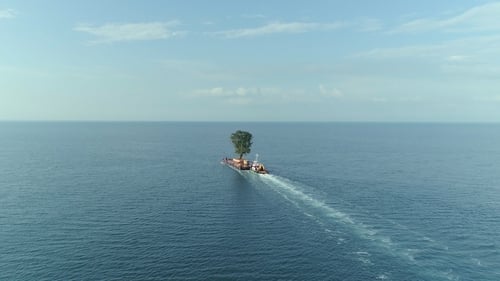
Editor
“We will reclaim our country and our people,” a leading figure in the right-wing populist party Alternative fur Deutschland (AfD) tells his party colleagues on Bundestag election night in 2017. They are celebrating as the AfD, founded four years earlier, surges into the German parliament with 94 seats, instantly making it the third largest party. The Voice of the People follows four MPs—all men—for three years as they seek to extend their power.

Sound Recordist
У некоего влиятельного человека появилось необычное увлечение: в общинах на черноморском побережье Грузии он покупает для личного сада вековые деревья. Некоторые из этих деревьев достигают высоты пятнадцатиэтажного здания. Их пересадка на новое место нарушает привычный ландшафт и вынуждает живущих по соседству людей приспосабливаться к внезапным переменам, происходящим с их домами и улицами.

Editor
У некоего влиятельного человека появилось необычное увлечение: в общинах на черноморском побережье Грузии он покупает для личного сада вековые деревья. Некоторые из этих деревьев достигают высоты пятнадцатиэтажного здания. Их пересадка на новое место нарушает привычный ландшафт и вынуждает живущих по соседству людей приспосабливаться к внезапным переменам, происходящим с их домами и улицами.

Writer
The filmmakers first meet Stefan in 2015, in the therapy ward of Brandenburg Prison. Their first impression is of a polite, shy man. A warder tells them Stefan is an ice-cold woman-killer. The filmmakers follow him through the last years of his prison term. They face some uncomfortable questions. Can anyone really know what is going on inside this man? The part of the protagonist is taken by a puppet, the scenes shift into theatre. Truth and falsehood blend in a cascade of presumption.

Director
The filmmakers first meet Stefan in 2015, in the therapy ward of Brandenburg Prison. Their first impression is of a polite, shy man. A warder tells them Stefan is an ice-cold woman-killer. The filmmakers follow him through the last years of his prison term. They face some uncomfortable questions. Can anyone really know what is going on inside this man? The part of the protagonist is taken by a puppet, the scenes shift into theatre. Truth and falsehood blend in a cascade of presumption.

Editor
The “Film about the Father” is a difficult genre. Andreas Goldstein, son of the GDR cultural functionary Klaus Gysi (1912–1999) has tackled this task with a complete lack of vanity, but with insistence: measured and calm, honest and intellectual, analytical and personal. He uncovers a mosaic that renounces both the teleologies of the self-styled winners of history and the simplifications of (West) German Oscar nominees. This film is not about the lives of others, but about his own life. Not about yesterday, about today, too.

Director

Editor
THE BLOCK introduces us to four sad figures living in a run-down East German prefab building: Hans-Joachim dreams of his great love. Silvio shoots out the lamps in former Soviet barracks. Olga wants to return to bombed-out Grozny; being alone is worse than war. Natalya cleanses her body with nettles and snow. The camera captures them in their cramped one-room apartments in extreme close-up, showing the pores of their skin and dandruff. Even in delicate moments, it does not keep its distance. In this way, we closely experience their precarious situation on the margins of society.

Music
THE BLOCK introduces us to four sad figures living in a run-down East German prefab building: Hans-Joachim dreams of his great love. Silvio shoots out the lamps in former Soviet barracks. Olga wants to return to bombed-out Grozny; being alone is worse than war. Natalya cleanses her body with nettles and snow. The camera captures them in their cramped one-room apartments in extreme close-up, showing the pores of their skin and dandruff. Even in delicate moments, it does not keep its distance. In this way, we closely experience their precarious situation on the margins of society.

Writer
THE BLOCK introduces us to four sad figures living in a run-down East German prefab building: Hans-Joachim dreams of his great love. Silvio shoots out the lamps in former Soviet barracks. Olga wants to return to bombed-out Grozny; being alone is worse than war. Natalya cleanses her body with nettles and snow. The camera captures them in their cramped one-room apartments in extreme close-up, showing the pores of their skin and dandruff. Even in delicate moments, it does not keep its distance. In this way, we closely experience their precarious situation on the margins of society.

Director
THE BLOCK introduces us to four sad figures living in a run-down East German prefab building: Hans-Joachim dreams of his great love. Silvio shoots out the lamps in former Soviet barracks. Olga wants to return to bombed-out Grozny; being alone is worse than war. Natalya cleanses her body with nettles and snow. The camera captures them in their cramped one-room apartments in extreme close-up, showing the pores of their skin and dandruff. Even in delicate moments, it does not keep its distance. In this way, we closely experience their precarious situation on the margins of society.









